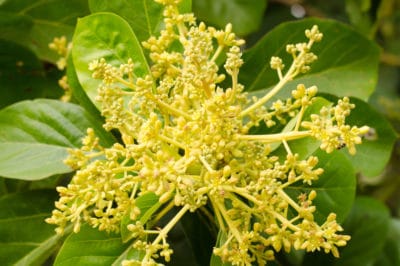Unusual Blossoms on Avocado Trees
Avocado trees produce millions of flowers, much more than other fruit trees, but only a small percentage of blossoms become pollinated and produce a fruit good for harvest.
When avocado trees bloom, they are covered with thousands of clusters of small, yellow flowers growing in panicles. Each panicle contains dozens to hundreds of individual flowers.
Two Avocado Flower Types
Avocado flowers come in two types, and each avocado variety has one or the other type of flower. Each flower contains both male and female reproductive parts, called, respectively, the anther and stamen on the male, which produces pollen, and the stigma on the female, which leads to the ovary where the fruit develops.
The two types of avocado flowers are called type “A” and type “B”. In both, the flower blooms for a total of two days, and the female part opens on the first day and the male opens on the second day. In type “A” blossoms, the female part opens in the morning and closes 2 to 4 hours later. In type “B” flowers, the female part opens in the afternoon for the same amount of time.
In both types, the male opens on the same flower on the second day, shedding pollen and fertilizing female flowers which happen to be open. This complex flowering habit helps assure that each flower is more likely to be cross-pollinated by a separate flower, resulting in better fruit set.
Flower types of popular varieties are:
Type “A”
- Pinkerton
- Lamb Hass
- Hass
- Gwen
Type “B”
- Zutano
- Bacon
- Ettinger
- Fuerte
Flower Types Affect Yield
When the two flower type are grown close together, trees of different type pollinate one another, and this leads to heavier fruit set and a better harvest.
Tpye “A” flowers produce fruit with a thicker, darker skin and higher oil content. Type “B” flowers produce fruit with a thin, bright green skin and lower oil content.
